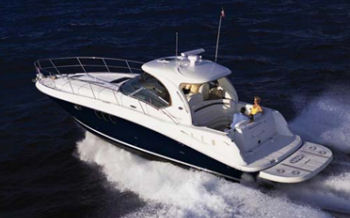Good Seamanship Starts with Semper Paratus
Sponsored by Sea Tow
Regular readers know that we like check lists. We think that if this technique is good enough for the gray-haired ex-Air Force pilots now flying a 737 full of passengers, then it’s good enough for us. Have you ever noticed that when you are ready to leave the dock you often get in a hurry? And then you forget things? We see it all the time. A boater has been working hard at a desk all week long and he can’t wait to get out on the water to go fishing, cruising, or rendezvous at his favorite beach with his buds. At one time or another we’ve seen boaters leave with lines still tied to cleats, a shore power cord still plugged in, and the dog and kids still ashore.
 Most boaters get into trouble within 25 miles of home port. Most likely that occurs because they were not planning on going far so neglected to take basic precautions. |
We are not going to get into all of the maintenance and seakeeping checks that you should always be doing to keep your boat doing what it is intended to do – float and propel itself along. Let’s just go over a few basic items you should go over before pushing off.
• Pre-trip Planning – Do you know where you are going? Have you checked your charts and gone over your courses. Don’t just rely on your GPS and chartplottter to get you there on the fly. Know your basic compass courses, intended speed, time to your destination, and fuel consumption. This should be done the day before your trip so that you can do it at leisure and thoughtfully. Depending on the speed of your vessel and the current you expect to encounter, crank in any appropriate heading changes required. It need not be elaborate. On the back of an envelope will due in most simple cases of going from A to B to C.
• Check the Weather – We like to do this the day before (in order to scrub early and save the day for something else if weather is obviously going to be bad). Then we check, local Doppler TV, and marine weather channel early in the morning before out departure. We always keep in mind that the biggest cause of general aviation mishaps is because the pilot/owner “had to get back” and took a chance on the weather coming back. It’s not enough to know that it’s nice out now. Don’t launch off into diminishing conditions just because you’ve been planning this trip for months.
• File a Float Plan – This obviously depends on where one is going and in what kind and size of boat. We don’t file float plans if we are just going across the sound in our 30-footer, but we would if we were going to sail across in an Optimist pram or paddle across in a kayak. If we’re going from Jacksonville to Charleston we’ll email a float plan to someone who will expect us to check in at a certain time.
• Fuel – Either you’ve got it or you don’t. You have already calculated how much you will burn, so how much do you have? Are you sure your fuel gauge is working and is accurate? Check your log to double check the reading. If in doubt, fill it up. Remember the 1/3 rule (1/3 fuel for going, 1/3 for returning, 1/3 for reserve for when, not if, things don’t go as planned) and do your calculations to ensure that you are not going to run out of fuel. We like to do all of this the day before or the morning of departure, never just prior to departure.
• Final Pre-Departure Check of the Vessel – Ever notice that pilots walk around the plane looking at its control surfaces before getting in the cockpit? We like to do the same thing before taking off on even a day trip, and again we do it long before departure time. We check all thru-hulls, close all hatches, check all fluids, do a complete electronics check, including VHF radio.
• Prepare Your Passengers – This is one procedure that most boaters don’t follow, but is in fact one of the most important things of all. Don’t feel self-conscious – you are doing your duty as master of the vessel and to do any less is to show disregard for your guests. Give a pre trip departure speech to educate your guests regarding the location of the emergency equipment. This includes the location of PFDs, fire extinguishers, first aid kit, and the VHF. When you get to the part about the VHF, be sure to include instructions on how to call for help. Make sure you are following all state and federal laws relative to the wearing of life vests.
• Prepare for Unforeseen Problems – One of the most challenging things about boating is that challenges pop up unexpectedly all of the time. Do you have a tool kit onboard? Do you have spare parts of things likely to break like hoses, hose clamps, and belts. If all else fails, do you have tow insurance? The average cost of a tow is $300 and towing insurance for a whole season costs far less. It also saves embarrassment to say nothing of saving you from doing something unwise in desperation. The smart captain is a prepared captain.
And that brings us to our Latin lesson of the day: Avoiding a crisis before it can happen makes you a good captain. The Coast Guard has a motto to remember is: Semper Paratus – “Always Prepared”.
